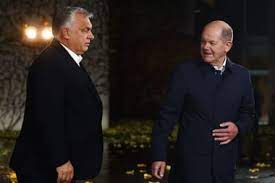Orbán’s walkout was planned, Macron says

Brussels: The coffee break that saved Ukraine’s EU accession bid had been planned all along.
Speaking to reporters after a summit where European leaders successfully bypassed Viktor Orbán’s resistance to Ukraine’s membership of the bloc, French President Emmanuel Macron said the idea behind the Hungarian prime minister’s dramatic exit from the leaders’ room was a collective effort.
In the run-up to the summit, European leaders coordinated a multi-pronged diplomatic effort to get Orbán to back down on his veto threat. According to several EU diplomats, Macron was coaxed into agreeing to leading the charm offensive on Orbán by his fellow leaders. He met Orbán for a private dinner in Paris last week and then on Thursday Orbán was treated to a breakfast with several EU leaders including Macron and German Chancellor Olaf Scholz, and a separate reported bilateral with Italian Prime Minister Giorgia Meloni.
Macron said he worked ahead of the summit with European Council President Charles Michel, Meloni, Scholz and “other leaders including [Dutch Prime Minister] Mark Rutte” to find a way to move forward without Orbán.
“In the end, we managed to suggest a solution,” Macron said, hinting that the leaders had gotten the idea from Orbán himself.
In an interview given to French weekly Le Point last week, the Hungarian prime minister had signaled that he would not use his veto to block a decision on enlargement for Ukraine.
“Legally speaking, it’s not exactly a veto. Let’s say I’m not contributing to make a decision that I think is bad,” he said at that point.
Orbán’s signal did not fall on deaf ears, Macron said.
“[Orbán] said exactly what we did. There was no surprise,” the French president explained.
By momentarily leaving the room, Orbán allowed the other 26 leaders to make the historic decision to open accession talks with Ukraine. Because such a move requires unanimous support, it would not have been possible with the Hungarian prime minister present.
This highly unusual method came as a major surprise, in an institution like the European Council where summits are regularly deadlocked by the need to reach a unanimous decision between leaders whose interests are at times opposed.
But it also brought a much-needed glimmer of hope to Ukraine, at a time when support for Kyiv appears to be dwindling among its Western allies and its military forces stall on the battlefield.
Prior to Macron’s statements, Scholz had explained that several leaders had been involved in the making of Orbán’s walkout — adding he was the one who presented the idea to the Hungarian leader.
“It was my plan that we had to manage to make a decision of this kind,” Scholz said.
“In the spirit of pro-Union behavior, I suggested to the Hungarian prime minister that we make it possible for us to take this decision in his absence,” the chancellor added, explaining that Orbán then took some time to consider the proposal before accepting the offer.
Yet, it doesn’t mean that EU leaders are willing to do it again.
“Most of the time, we should come to a decision together,” Scholz said. “That’s not something you should do every time.”





